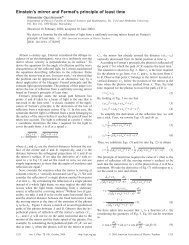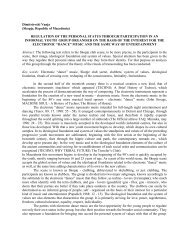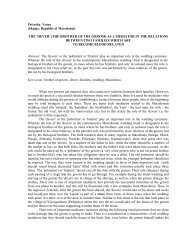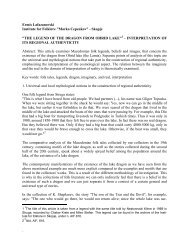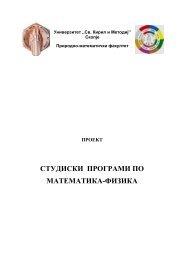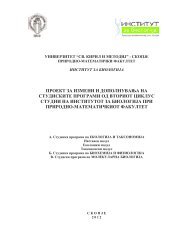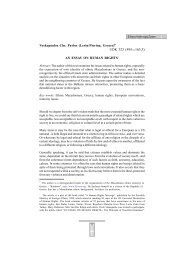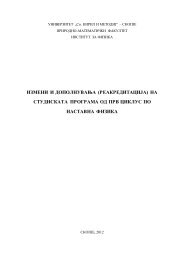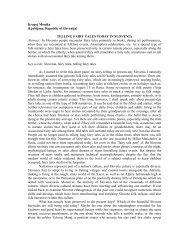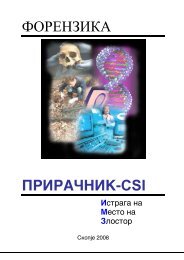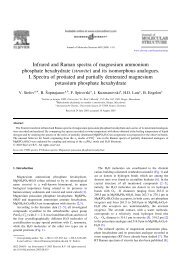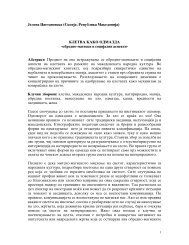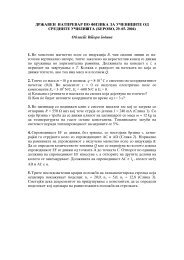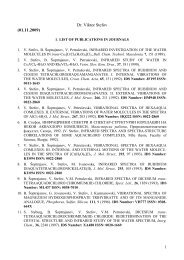Ljupco Nedelkov (Skopje, Macedonia) THE BIRTH RITUAL OF ...
Ljupco Nedelkov (Skopje, Macedonia) THE BIRTH RITUAL OF ...
Ljupco Nedelkov (Skopje, Macedonia) THE BIRTH RITUAL OF ...
Create successful ePaper yourself
Turn your PDF publications into a flip-book with our unique Google optimized e-Paper software.
izgore" (If it's good, let God be good to you - if it's bad, they shall burn in flames) (Inf.<br />
no. 6).<br />
The mala molitva is a church ritual for purifying the rodilka and the newborn by<br />
using sanctified water. After the child was born, one of the family would go to church to<br />
get a molitva. The molitva was carried in a bottle which was always closed with basin.<br />
Until the fortieth day, the molitva would be poured in the newborn's bathing water, and<br />
the rodilka would drink it and spray it on her breasts in order to keep her milk ritually<br />
pure. After the end of this period, the rest of the molitva was poured out in running water<br />
(Inf. no. 6).<br />
For the newborn, the first breastfeed is in fact ritual transition in the diet. Until<br />
his/her birth, the food was provided by the umbilical cord. After birth, the newborn<br />
becomes a suckling.<br />
According to tradition, the newborn had to be breastfed by another woman (doilka<br />
- a woman who breastfeeds). She would sit on the threshold of the outside door and<br />
breastfeed the child (Inf. no. 23). As of that moment, the doilka would become mother by<br />
milk to the newborn. Since it was believed that the newborn may magically inherit the<br />
character of the doilka, great attention was given to making sure that the doilka was both<br />
physically and mentally fit. This ritual symbolically underlined the acceptance of the<br />
newborn by a certain woman from the community, which was a traditional action for<br />
aggregation.<br />
After the third day, the newborn's mother would start to breastfeed it. This was<br />
supplemented by a number of ritual-magical actions. For example, the mother had to<br />
breastfeed her child with her right breast through a golden ring, and the mother-in-law<br />
would sieve yeast, bread, sugar etc. over her head. During the ritual beginning of the<br />
breastfeeding, the magical activities symbolically initiated the cultural verification of the<br />
newborn in the process of introduction into the community.<br />
The ritual zaluluvanje (rocking the baby in a pram) of the baby would happen on<br />
the third night. Ritual food was prepared, including pogaca (a traditional pie), beans,<br />
boiled maize, serbet (boiled sugar), raisins etc. The newborn was dressed in new clothes<br />
and wrapped in his/her father's shirt (white, old-fashioned), where ritual objects were<br />
placed: book, pencil, scissors etc., and the grandmother would utter magical chants,<br />
hoping to initiate the child's future job, so that it's educated, literate, a good craftsman etc.<br />
The zaluluvanje was carried out near the fireplace or besides a bowl with live coal. The<br />
ritual zaluluvanje near the fire or its equivalent, the coal, openly boosts the aggregatory<br />
role of this ritual. Tradition says that the fireplace is sacred and holy; a symbol of the<br />
family and the kin which is closely related to the domestic gods, and in that sense also to<br />
the cult of the prececessors. During the ritual zaluluvanje the child was left on the ground<br />
three times; this ritual can be deciphered by using the semiotics of the carriers of coded<br />
information which contain the number three and Earth.<br />
According to tradition, at the third night the three narecnici (oracles) in order to<br />
determine the child's future. The narecnici were imagined to be three women dressed in<br />
black. It was believed that great power was vested in these creatures. They would come<br />
during the gluvo doba, when everybody was asleep, and would determine the newborn's<br />
life code (his/her sudbina - k'smet (both words mean destiny)). The narecnici would<br />
finish at the second cock crow and then leave. Their prophecy was final and<br />
unchangeable. That's the origin of the proverb which can be heard very often: "Od



